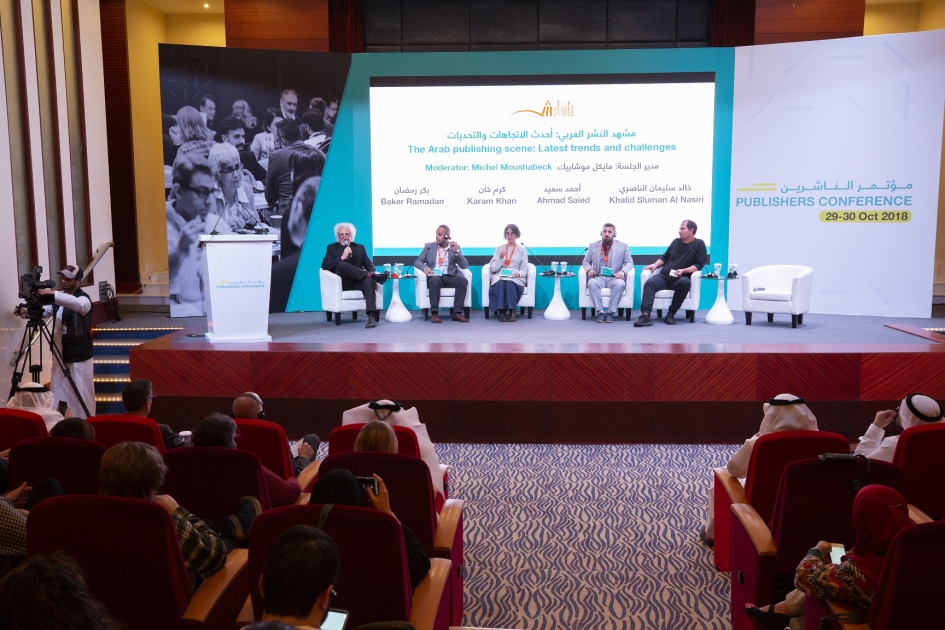
8th Publishers Conference Discusses Freedom of the Press and Role of Technology
Ahead of the official opening of the 37th Sharjah International Book Fair (SIBF) on October 31, Sharjah Book Authority (SBA) organised the 8th Publishers Conference to discuss challenges and opportunities facing the publishing sector in the region and around the world.
Taking place at the Sharjah Chamber of Commerce today and tomorrow (October 29 and 30), the conference focuses on the latest publishing trends, threats and challenges and how to do business with Arab publishers.
HE Ahmed Al Ameri, Chairman of Sharjah Book Authority introduced the conference by stating the event’s three main objectives: communication, training and marketing. And how the combination of these three elements would help to build one vision and build bridges between different traditions and cultures in the publishing sphere.
During his keynote address, President of the International Publishers Association (IPA), Dr Michiel Kolman, called for the freedom to publish. “Publishing should not be a matter of life and death, freedom to publish means publishers should publish work, even if they challenge established ideas or provoke controversy.
“In an internet age, when everyone can publish anything, there is a risk that we choose not to out of fear. Publishers have the responsibility to promote the freedom of publishers and support those that are not free.”
Kolman also touched upon the role of technology in the publishing world and how publishers are responding to today’s challenges.
“The age of our industry and the predominant technology it uses causes many to think it’s reluctant to change, but nothing could be further from the truth,” Kolman adds. “The digital transition continues and publishers are playing a leading role in that transition. Digital publishing is the opportunity for more accessible books that are available to an even bigger audience.”
Kolman also called for copyright laws to be firmly established and enforced as a tool to instill the ownership of intellectual property, something, he admits, that will force publishers to reconsider their publishing models. But key to this is education and access to essential data.
“Our ability to make decisions about the future of publishing is based on the availability of reliable data gathered over time,” Kolman said. “It’s of vital importance that both industry and governments produce data on publishing. The IPA is working with the World Intellectual Property Organisation to do exactly this. We want to ensure that all players understand that good policy making in the fields of copyright and education needs to be based on solid evidence.”
Moderating the first session on The Arab Publishing Scene: Latest Trends and Challenges was Michel Moushabeck, Founder and Publisher at Interlink Publishing. He was joined by Khalid Sluman Al Nasiri, Al Mutawssit Publisher, Italy; Ahmad Saied, Al Rabie Publishing, Egypt; Karam Khan, Al Khan Books for Publishing, Egypt; and, Baker Ramadan, Al-Shamel Publishing, Palestine.
Key to this session was the need for greater education about publishing rights and greater quality control when it comes to the written word.
Al Nasiri started by calling for more education about publishing rights. A lack of education about the rights of publishers is a common discussion point in the Arab region, he added. This point was echoed by Ramadan who stated that ‘copyright rules’ and guidelines regarding intellectual property were not yet established in Palestine.
Publishing houses also need to focus on producing “quality literature,” the panel agreed. “You should have an editor to complete the work for an international audience. Quality is needed, so there are no spelling mistakes and/or grammatical mistakes.” Saied said.
Essentially, we need to define what publishing is Ramadan added. “What is editing, what is copyrighting. . . education is needed.”
In conclusion, Moushabeck reiterated the essential role books play in today’s modern society. “There has never been a more important time for books to educate … to heal. Speaking through literature is the loudest voice around.” he said.
“Right now translation is more important than ever; it fosters communities that otherwise would have been divided by cultural barriers.”
Touching once again on the need for education when it comes to publishing was Iraqi Novelist, Poet, Screenwriter and Documentary Film Maker, Ahmed Saadawi. During his keynote address he called for a common framework, where the rights of authors, publishers and illustrators were clearly defined.
Another session on the first day of the Publishers Conference examined How to do Business with Arab Publishers.
Moderated by Simon de Jocas, President of Les 400 Coups and joined on the panel by Dr Imad Al Akhal, Ibiidi, UK; Nasser Assi, Maalem for Printing, UAE; Al Hareth Mahmoud, Dar Al Fan for Design, Jordan; and, Khaled Al Bilbeisi, Dar Al Manhal Publishers, Jordan, discussions centred on one simple yet essential thing: the need to establish a good relationship between author and publisher.
Day Two of the Publishers Conference will start tomorrow where key sessions will discuss how to encourage competition in educational publishing and the role of children’s publishing in the Arab world.


























